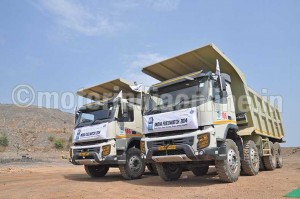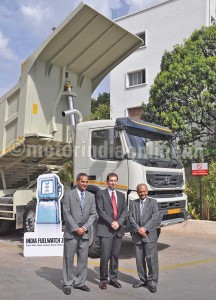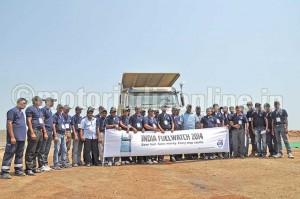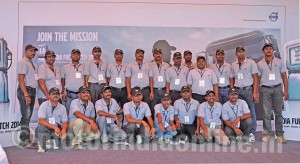Committed to achieve best man-machine performance
 Increased fuel efficiency implies greater saving of money and reduced CO2 emissions. Getting the most from every drop of fuel depends on factors ranging from engine and transmission performance to the truck cab design, the routes taken and the driver’s attitude. Since fuel prices account for a large portion of the fleet’s total operating costs, Volvo has pioneered several strategies to help customers log more miles using less fuel. ‘Volvo Trucks India Fuel Watch 2014’ re-emphasizes the importance of the best driving practices to improve fuel efficiency in mining operations.
Increased fuel efficiency implies greater saving of money and reduced CO2 emissions. Getting the most from every drop of fuel depends on factors ranging from engine and transmission performance to the truck cab design, the routes taken and the driver’s attitude. Since fuel prices account for a large portion of the fleet’s total operating costs, Volvo has pioneered several strategies to help customers log more miles using less fuel. ‘Volvo Trucks India Fuel Watch 2014’ re-emphasizes the importance of the best driving practices to improve fuel efficiency in mining operations.
Volvo Trucks India Fuel Watch 2014, the fifth edition of the competition, was recently held at a coal mining site in Managuru, near Kothagudem, Telangana. A total of 24 best drivers from key Volvo tipper customers operating in the mining segment across the country participated in the annual fuel efficiency competition, selected through rigorous qualification process.
The competition was part of Volvo Trucks’ effort to educate drivers, fleet managers, customers and other stakeholders on the importance of good driving practices to improve fuel efficiency, reduce cost and increase profitability. Fuel efficiency is the most critical aspect of profitability in mining transport, and Volvo Trucks remains committed to improve customer’s overall profitability from its vehicles, while encouraging safe driving practices and environmental care through reduction in emission.
The competition highlights the importance of good, safe driving practices and promotes thorough understanding of the latest technologies of Volvo’s high performance tippers, to achieve the best man-machine performance.
“Fuel efficiency and vehicle productivity are critical aspects of truck mining operations. We are the undisputed leader in this market, thanks to our world class technology and our focus on the combined performance of man and machine together”, said Mr. Philippe Divry, Sr. Vice President, AB Volvo & VECV Board member, while addressing a press conference to announce the results of the competition. He said: “Volvo is the first CV manufacturer to set up a driver training centre in India to make good drivers better in demanding applications.”
Speaking on the occasion, Mr. Vinod Aggarwal, CEO, VECV, observed: “At Volvo Trucks, we place special emphasis on superior driving skills because it plays an important role in achieving better fuel efficiency and increased profitability”. Fuel cost constitutes almost 50 per cent of the truck’s running cost.

Other expenses like investment or maintenance are much less compared to the cost the customer incurs on the fuel. “Fuel saving means CO2 reduction, thus environment and economy go hand in hand”, he added.
Volvo trucks are known for their productivity. From a smooth ride to easy handling, the trucks are built with the driver’s comfort in mind. A fleet operator gets maximum yield only when his driver knows to drive for better fuel efficiency, productivity and safety.
The contest was primarily based on four key parameters – fuel consumption, usage of engine and transmissions while driving, the time taken to complete and then the attitude of the driver in following the rules of the competition.
On the successful completion of the competition, Mr. A.S. Ramarao, Sr. VP Sales, Marketing & Aftermarket, Volvo Trucks, said: “Volvo Trucks India Fuel Watch competition is the first of its kind. We started this journey of India Fuel Watch way back in 2010. This is the fifth edition, a unique event based on global platform to show our strong commitment for fuel efficiency and towards environmental care. The primary objective of this championship is to sensitise all our stakeholders in the business in terms of fuel efficiency and driver productivity. As we all know, drivers are the key when it comes to driving fuel efficiency and productivity in the CV business. Driver productivity can make a big difference in the transport industry. Up to 30 per cent of the fuel cost can be saved by having right drivers with the right attitude and good understanding of the machine.”
The competition is just as much about learning as winning. It gives the participants a platform to upgrade their knowledge and enhance their driving skills, making them better drivers with inputs they could use during their entire lifetime. “We went to different parts of the country and had 12 local competitions where drivers from various regions participated. The final contest was a round trip covering a distance of 3.3 km where all the contestants drove two FMX trucks, one in loaded and the other in unloaded condition. This is a fantastic training event that we at Volvo Trucks are determined to continue year on year”, added Mr. Ramarao.
 The competition was conducted by Volvo Trucks Driver Training Centre based on global standards and practices laid down by Volvo Trucks, giving each driver identical conditions and opportunity on a carefully selected route in a coal mine. The trucks had electronic management system that recorded the trip data, including fuel consumption. Before starting of each trip the trip meter was reset and at the end of the trip the data was downloaded through trip manager software.
The competition was conducted by Volvo Trucks Driver Training Centre based on global standards and practices laid down by Volvo Trucks, giving each driver identical conditions and opportunity on a carefully selected route in a coal mine. The trucks had electronic management system that recorded the trip data, including fuel consumption. Before starting of each trip the trip meter was reset and at the end of the trip the data was downloaded through trip manager software.
The Volvo Driver Training Centre has so for trained over 50,000 drivers. It helps the drivers understand the latest truck technology, its proper use, safe driving practices and ways of achieving better fuel efficiency.
Mr. R. Satyanarayana from BGR Mining & Infra Pvt. Ltd. was adjudged the winner, followed by Mr. J. Sampath Raju from SV Engineering Constructions, the first runner-up, and Mr. Sudharshan Dhal from Montecarlo Ltd., the second runner-up. The competition was the ultimate test for Volvo tipper drivers to bring out the best in driving practices under tough off-road conditions and achieve highest fuel efficiency.
The winning driver achieved a remarkable 18 per cent higher fuel efficiency compared to the driver with lowest fuel efficiency in the competition.
 Speaking on the sidelines of the press meet, Mr. Vinod Aggarwal shared some industry updates about the current scenario in the truck market and also on the strong market entry of its Pro series of vehicles. He said: “In the last couple of months, we have seen a gradual recovery in the heavy-duty truck market and expect the market to grow further. With the new Government in place, we expect importance to be given for infrastructure development, building good roads and relaxation of norms in the mining sector to boost growth. From our side, our first two truck models from our Pro series range, Pro 1000 & Pro 3000, have already hit the market. The Pro 6000 trucks will be out soon, while the Pro 8000 will hit the roads by the end of 2014. We will continue to launch models with the rest of the range set to hit the market through next year.”
Speaking on the sidelines of the press meet, Mr. Vinod Aggarwal shared some industry updates about the current scenario in the truck market and also on the strong market entry of its Pro series of vehicles. He said: “In the last couple of months, we have seen a gradual recovery in the heavy-duty truck market and expect the market to grow further. With the new Government in place, we expect importance to be given for infrastructure development, building good roads and relaxation of norms in the mining sector to boost growth. From our side, our first two truck models from our Pro series range, Pro 1000 & Pro 3000, have already hit the market. The Pro 6000 trucks will be out soon, while the Pro 8000 will hit the roads by the end of 2014. We will continue to launch models with the rest of the range set to hit the market through next year.”
Fuel efficiency Stats
Vehicle condition Lowest Highest Difference
Km/L Km/L
FMX (Unloaded) (R1) 1.45 1.88 30%
FMX (Loaded) (R1) 0.84 1.00 19%
FMX (Un Loaded) (R2) 1.52 1.82 16%
FMX (Loaded) (R2) 0.89 1.00 12%
Total 1.20 1.41 18%
Competition Highlights
• The final competition was conducted on 11-12 June, at a mining site in Kothagudem, Andhra Pradesh
• Total round trip distance per trip – approx. 3.3 km
• 4 trips per driver (2 loaded and 2 unloaded)
• Before the start of each trip, the trip meter was set to zero
• Idle fuel consumption was eliminated
• Identical operating conditions were ensured
• Driver training was done on the sidelines